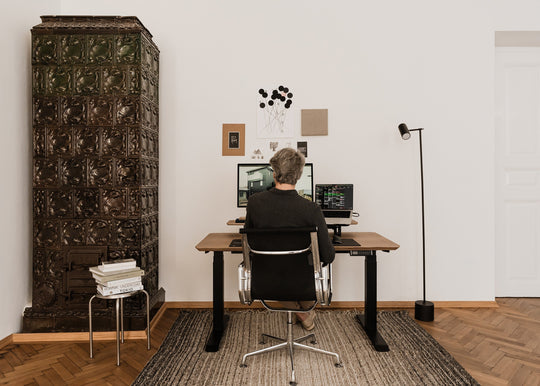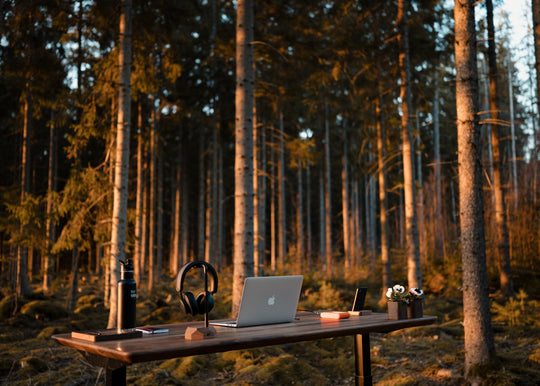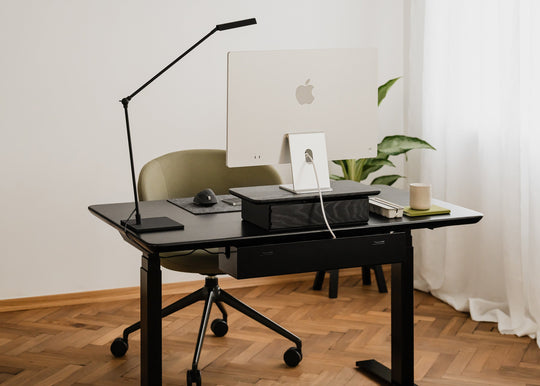
Relax! On the invaluable role of rest and regeneration
There are many tried and tested ways to have a productive summer and remain focused on work despite the wonderful weather outside. However, even religiously sticking to the productivity script will not bring the desired results without proper rest and regeneration of strength. We asked our expert, Dr. Konrad Kulikowski from the Evidence-Based HR blog, about the importance of rest and disconnecting from work.

Photo by Olena Sergienko on Unsplash
How can consistent overworking and lack of rest influence our mental health? What issues and disorders can it lead to?
From a psychological point of view, it is not a question of how much we work and how tired we get, but of how well we regenerate. Despite the common belief that overworking yourself and going above and beyond leads to lack of rest, it doesn’t have to be the case. A good organization of work and personal life can ensure we stay fresh even with an increased and intensified workload. Think of your body as a renewable energy source, an optimally and naturally charged battery.
When we come to work, our natural response to various obstacles we must face are psychological and physiological reactions, such as: exertion, concentration, anger, anxiety, or excitement. These reactions use up our energy reserves. Our body has the ability to replenish the energy reserves but can only do so once the tedious work expectations stop affecting us. We cannot successfully regenerate under stress as it continuously drains our energy. It’s as if we were charging our phone and continued to heavily use it the whole time – the phone may die despite being connected to power and our attempts at charging. Similarly, if the high demands of our jobs continue to affect us with no breaks, our body has no way to bring our energy back up to optimal levels. The role of rest is to provide a respite from stressors and an opportunity for complete regeneration – a natural way of charging your inner battery.
We can handle doing a lot of work, working long hours, and intensifying our efforts, provided we get quality rest and find happiness in what we do – this should prevent most negative psychological effects. What is dangerous, however, is working in a chronic state of energy depletion, that is when we haven’t had a chance to regenerate before a new and challenging day at work. Remember that it is not hard work itself, but the lack of mental and physical rest that affects the way we function. This is important because instead of saying “work less”, we should suggest “regenerate more” as our sage advice for the weary.
One of the main negative consequences brought on by inadequate regeneration after work is not living up to our professional potential. Bad regeneration leads to lower engagement, feeling exhausted, low-quality work, and strained relationships with coworkers, which, in turn, can cause you to underperform and stunt the development of your career or passion. Another aspect of life that can be affected by failing to regenerate is our personal relationships. Research shows that lack of proper rest, specifically the tiredness and irritability that follow, can negatively impact the quality of our relationships. Moreover, one person’s fatigue can also affect the wellbeing of other members of the household – regularly neglecting domestic chores and missing out on family time can cause frustration amongst those close to us. Improper regeneration can also lead to very serious health consequences – a consistent lack of regeneration can lead to professional burnout, sleep disorders, and even a higher risk of death as a result of cardiovascular disease. Replenishing the strength we have used up over the course of the workday is not a luxury, nor a whim, it is a key condition for a healthy life.
To find out whether we may have a problem with regenerating fully after work, let’s try to answer the below questions with “yes” or “no”:
- Is it difficult for me to relax after work?
- Am I exhausted at the end of each day?
- When I wake up, do I feel like I have no energy to go to work?
- Do I lack free time to properly relax?
The above ‘test’ is for entertainment, not diagnostic purposes, however it encourages deeper reflection – the more “yesses”, the higher the chance you might suffer from lack of adequate rest. It could indicate that your methods of unwinding after work are insufficient and your approach must change.
Remember that lack of regeneration and excessive fatigue won’t always be the culprits behind health problems, they might only be symptoms. For example, someone suffering from depression will feel tired but taking time off and attempting to regenerate won’t help much. Continuing with the battery metaphor, the issue is not with the battery’s ability to regenerate, but its decreased capacity to store it. Therefore, unexpected fatigue should prompt us to look for its source and, should attempts at regeneration fail, seek professional psychological help.

Photo by David Lezcano on Unsplash
Are there foolproof methods for mentally distancing ourselves from work while on vacation? Especially when our job is also our passion and we love what we do?
Paradoxically, regular relaxing breaks should be part of our schedule especially when we like what we do – as we have already mentioned, we cannot do our jobs well without proper rest. An athlete cannot train non-stop, they require downtime to gather their strength before competitions. Similarly, an employee cannot work all the time. The more we value our job, the more care we should put in fully regenerating, so that we can go to work with our optimal levels of energy. Employers who see rest as merely a modern whim should answer this question: can you afford to have your employees work at 10%?
How to regenerate?
Psychologists highlight a few experiences which promote good, restorative rest – mentally distancing yourself from work while on holiday is only one of them. Let’s have a look at what elements make up good rest and what to remember when planning vacations, as not all of them are that obvious:
- Mentally disconnecting from work – stopping ourselves from working, and having negative thoughts relating to work, distancing ourselves from what goes on at the office, feeling like, in that moment, work problems do not concern us.
- Relaxation – pleasant, calming, unwinds our body and mind, switching us to low nervous system activation mode.
- Belonging – experiencing contact and good relationships with a supportive group of people who we feel connected to and good around. Who we interact with is as important as what we do.
- Sense of achievement – regeneration thrives on experiencing growth, self-fulfillment, developing skills, confronting challenges, achieving or pursuing something important, worthwhile, valuable, and rewarding.
- Feeling of control – autonomy of leisure, having the ability to choose what to do and how to do it while resting, doing what we want and how we want it.
Try to include as many of these regenerating experiences as you can while planning your rest. Unfortunately, a universal list of ways to achieve the above mentioned experiences does not exist. If psychology ever taught us anything, it is that all people are unique, have their own preferences, expectations, and favorite ways of spending time. Different people can attain the same experiences from different activities. One person can feel accomplished having beaten their own 5k time, another experiences the feeling after trying 10 previously unknown dishes. Let’s have a look at some of the strategies meant for invoking feelings compatible with regeneration, and we might find something inspiring.

Photo by Medium Rare on Unsplash
Disconnecting from work
Plan vacations during quieter times when our contributions are least needed at work, try to finish all projects before our time off, let our coworkers know about our absence in advance, and give them instructions on what to do in case they need our help. If possible, establish a routine of your vacation plans, for example, going away for 2 weeks every year on July 20th so that everyone knows we are usually unavailable during this time. Uninstall our work email from our private phone, craft an out-of-office message, and leave our work phone at home.
Relaxation
When planning our vacation, we should try to include a combination of active or intense leisure activities, as well as periods of unwinding, doing nothing, and simply chilling. Balance hiking during the day with an evening in a spa. After a full day of cycling along the Baltic coastline, we should plan to also spend a laid back day on the beach. We can party hard in Ibiza but shouldn’t forget to detox and read a book or watch a show. If we truly wish to relax, we should plan enjoyable and low-stakes activities, not house renovation or a doctors visit.
Belonging
People are social animals, so, if possible, we should try to regenerate with people we enjoy being around. Spending time with like-minded people gives us a sense of belonging to a social group, which is one of the basic human needs. Vacationing together is helpful in creating new memories and adventures which we can always go back to even when the break is long over. If we prefer solo trips, we shouldn’t forget to call back home and talk about our experiences. We could also share our escapades on social media, but on one condition – that we use them to inform others of what is going on in our lives and not to debate them. This is also effective in making us feel like we belong to a larger group of people, even though we’re traveling alone.

Photo by Solen Feyissa on Unsplash
Sense of achievement
Although it might seem surprising, one of the important elements of good, regenerative rest is the feeling of accomplishing something important, something worthwhile. We should try to keep that in mind while planning our next holidays. We could make a list of things we wish to do in life and see if any of them can be ticked off on your next vacation. If we want novelty, we should think of new things we can try in our holiday destination. If work is our passion, we can read a book to help grow our professional skills. If we feel overworked, a full day without answering any work calls can be considered an accomplishment in itself. Climbing mountains, breaking records, collecting foreign species of flora, visiting new places, sampling new cuisines, spending time with children, reading long overdue books, watching unseen shows – the list is endless. It doesn’t have to be anything qualifying for the Guinness World Records list, what is important is that it matters to us personally and we are proud to have achieved it.
Feeling of control
We have all witnessed a vacation argument over where to eat dinner, what hiking trail to pick, where to put the beach towel, which museum to visit, or how many waffles to buy. Why do these, at first glance, trivial matters often cause more serious holiday crises? This is how one of basic human needs, the need for control, manifests – everyone wants to have a say over how they live their lives, including how they spend their time off. To remedy this and plan calm, regenerative vacations, we should acknowledge our companions’ need for control and give everyone some way of showing their autonomy and independence. Fans of order and organization should create a precise itinerary for everyone to know the time and place of each activity. If we want to keep it spontaneous, rotating the power to decide what to do each day is the way to go. We can also allow everyone to spend a portion of the day by themselves, doing what they desire and then meeting back for a joint meal. Free time is essential to allow everyone to pursue their own plans without others’ input. We should also not forget about ourselves. If we plan a trip around others’ preferences while neglecting our own, we might end up souring the experience for ourselves and our companions with low mood. The need for control is one of the basic human needs. The argument over waffle toppings is not about whipped cream or cherries but about the ability to decide.
To sum up, while planning a getaway, we should focus on the experiences we wish to enjoy, rather than specific actions and activities we want to ‘tick off’. To make things easier we should ask ourselves whether we have planned enough activities to facilitate the creation of life experiences: detaching from work, relaxing, maintaining positive relationships, pursuing meaningful achievements, and spending leisurely time on our own terms.
Cover photo by Tobias Tullius on Unsplash








